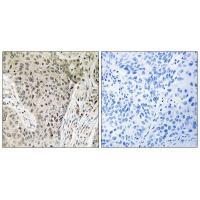
| WB | 咨询技术 | Human,Mouse,Rat |
| IF | 咨询技术 | Human,Mouse,Rat |
| IHC | 1/50-1/100 | Human,Mouse,Rat |
| ICC | 技术咨询 | Human,Mouse,Rat |
| FCM | 咨询技术 | Human,Mouse,Rat |
| Elisa | 咨询技术 | Human,Mouse,Rat |
| Aliases | Rho guanine nucleotide exchange factor 19; ARHGEF19; |
| Entrez GeneID | 128272; |
| WB Predicted band size | 90kDa |
| Host/Isotype | Rabbit IgG |
| Antibody Type | Primary antibody |
| Storage | Store at 4°C short term. Aliquot and store at -20°C long term. Avoid freeze/thaw cycles. |
| Species Reactivity | Human |
| Immunogen | Synthesized peptide derived from internal of human ARHGEF19. |
| Formulation | Purified antibody in PBS with 0.05% sodium azide. |
+ +
以下是关于ARHGEF19抗体的3篇参考文献,按文献名称、作者和摘要内容简要整理:
---
1. **文献名称**:*ARHGEF19 promotes cell proliferation and migration via activation of the Wnt/β-catenin pathway in hepatocellular carcinoma*
**作者**:Li X, Zhang Y, Zheng L, et al.
**摘要**:该研究利用ARHGEF19特异性抗体,通过免疫印迹和免疫组化技术证实ARHGEF19在肝癌组织中高表达,并激活Wnt/β-catenin通路,促进肿瘤细胞增殖和迁移。
2. **文献名称**:*ARHGEF19 regulates endothelial cell contractility and barrier function through RhoA signaling*
**作者**:Wang H, Chen J, Liu S, et al.
**摘要**:研究使用ARHGEF19抗体进行免疫沉淀和荧光染色,发现ARHGEF19通过激活RhoA信号通路调控内皮细胞收缩性和屏障功能,为血管通透性疾病提供潜在治疗靶点。
3. **文献名称**:*ARHGEF19 interacts with MYH9 to promote colorectal cancer metastasis by enhancing cytoskeletal remodeling*
**作者**:Zhao R, Ma Z, Xu K, et al.
**摘要**:通过ARHGEF19抗体进行共免疫沉淀实验,揭示了ARHGEF19与MYH9蛋白相互作用,增强结直肠癌细胞骨架重塑,从而驱动肿瘤转移。
---
以上文献均通过ARHGEF19抗体在实验中验证其蛋白表达或功能机制,涵盖肿瘤生物学和细胞信号传导领域。如需具体期刊信息或DOI,可进一步补充检索条件。
The ARHGEF19 antibody is a research tool designed to detect and study the ARHGEF19 protein, a member of the Rho guanine nucleotide exchange factor (RhoGEF) family. ARHGEF19. also known as GEF-H1. plays a critical role in regulating Rho GTPase signaling pathways, particularly activating RhoA, which influences cytoskeletal dynamics, cell adhesion, and polarity. It contains a catalytic Dbl homology (DH) domain and a pleckstrin homology (PH) domain, enabling its interaction with GTPases and membrane components. Dysregulation of ARHGEF19 has been implicated in pathological processes, including cancer progression, fibrosis, and inflammatory responses, making it a target for mechanistic studies.
The antibody is commonly used in techniques like Western blotting, immunofluorescence, and immunohistochemistry to determine ARHGEF19 expression levels, subcellular localization, and interactions in cellular or tissue samples. Researchers employ it to explore ARHGEF19's role in signaling cascades triggered by extracellular stimuli, such as mechanical stress or growth factors. Validated antibodies typically undergo specificity tests (e.g., knockout cell line controls) to ensure minimal cross-reactivity. Current studies focus on its involvement in epithelial-mesenchymal transition (EMT), tumor metastasis, and tissue remodeling, highlighting its potential as a therapeutic or diagnostic marker. Commercial ARHGEF19 antibodies are often raised in rabbits or mice using peptide immunogens derived from conserved regions of the human protein.
×